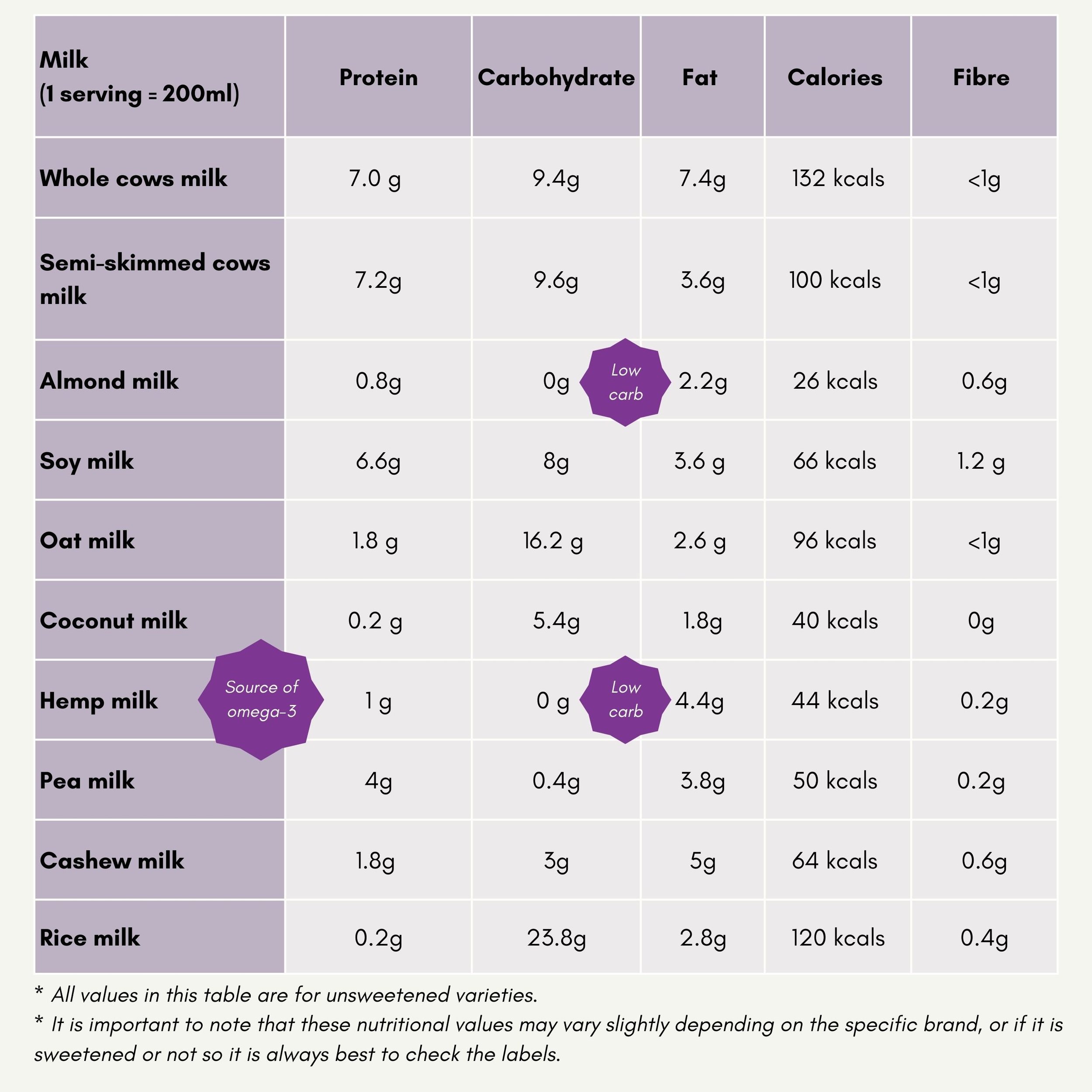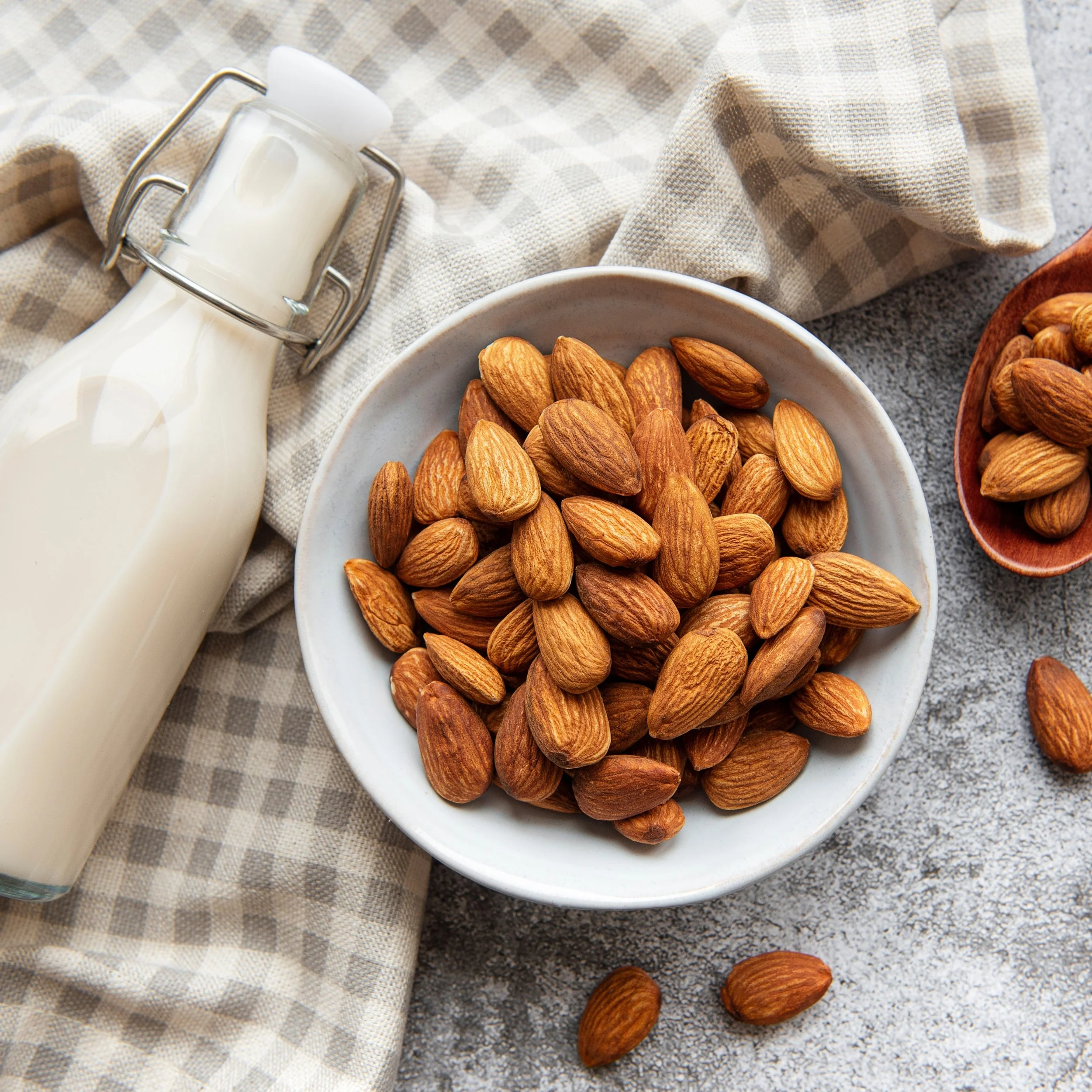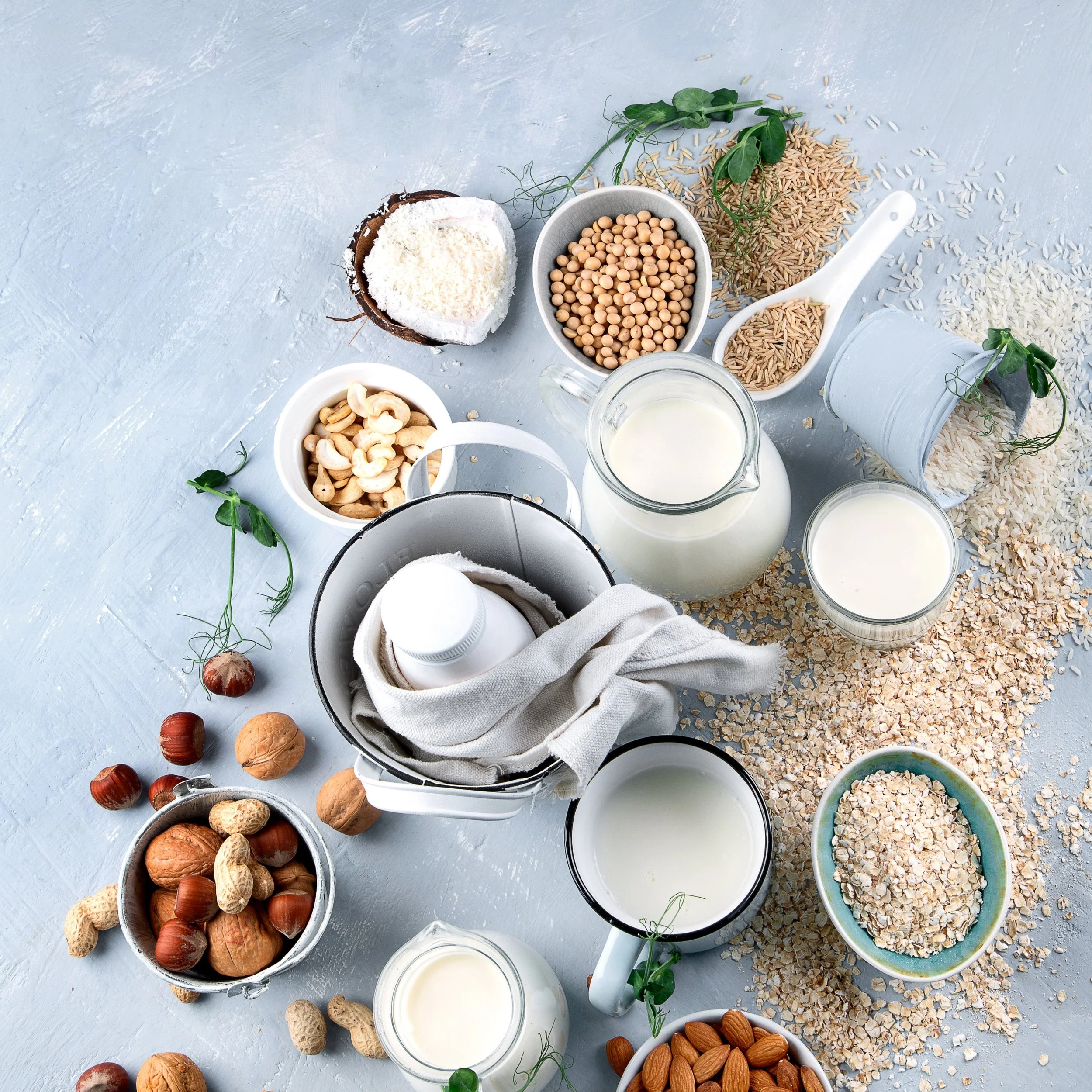Is Almond Milk good for PCOS?
Milk is a vital source of nutrients such as protein, calcium and vitamin D, shown to be important for PCOS (1). In the last few years, there has been a shift in the type of milk we are consuming, from dairy milk, to plant based alternatives. In fact around one in three of us now drink plant milks such as almond, soya and oat (2). But with so many different options to choose from, you may be wondering if almond milk is good for PCOS or perhaps another plant based milk? In this post we aim to answer questions on this topic to help you choose which milks are best for you to manage your PCOS symptoms.
Why plant based milks can be a good alternative to dairy?
The main difference between dairy and plant based milk is the presence (or lack thereof) of lactose. Lactose is a type of sugar found in dairy that requires a specific molecule, lactase, to break it down (3). Some people have a fault in the production of lactase, and therefore experience discomfort when trying to break down lactose in milk, a condition called lactose intolerance (3). Although research investigating links between PCOS and lactose intolerance is limited, we explore the relationship between dairy and PCOS in our blog post Do I have to go dairy free with PCOS? That being said, it’s worth sticking around here to find out what makes each plant based milk alternative unique and whether there are any benefits to consuming them for your PCOS symptoms.
Nutritional profile of different milks
With the variety of plant based milks on the market, it is hardly surprising to learn that their nutritional profiles vary. Understanding the nutrient content of each milk can help with deciding which plant based milk may be best for you. This table below shows the amount of protein, carbohydrate, fat, calories and fibre in an average 200mls serving (1 glass).
Almond Milk & PCOS
Almond milk is one of the lowest in protein, carbohydrates, fats and energy. It is made by blending soaked almonds with water, salt and other add-ins. One review of plant-milks found that almond milk requires the largest amount of water to be produced (4), so if environmental impact is an important deciding factor for you, maybe almond milk isn't the one.
Fancy a go at making your own almond milk?
Made from a few simple ingredients, it’s relatively easy to make your own plant-based milk.
Soak around 250g of almonds in cool water overnight.
Add your soaked almonds, 1 litre of fresh water, salt and any additional flavourings (such as vanilla extract or cocoa powder) to a high speed blender and blend until smooth and creamy.
Strain using a thin cloth (a thin, clean dish towel will do), and pour into an airtight jar or bottle.
Your homemade almond milk will keep in the fridge for 4-5 days. Ensure to shake well before use.
Other plant based milks
1. Soy Milk
Soy milk originates from China but has become popular in diets worldwide due to its nutritional profile. As well as a good source of protein (comparative to dairy milk), soy milk contains unique bioactive nutrients which could be health promoting (5). There is also speculative evidence for the ability of bio-chemicals; genistein and iso-flavones, present in soy milk, to reduce markers of oxidative stress and inflammation in people with PCOS (6). This evidence was however only applicable when patients are supplemented with the bioactive compounds and not specifically soy milk itself.
2.Oat Milk
Due to its starchy grain base, oat milk has one of the highest carbohydrate contents of all the plant-milks. If you have issues with blood sugar control, or have been diagnosed as pre-diabetic or diabetic, then an alternative milk may be better for you. Oat milk is reported to have a grainy, nutty or even, hay-like or grassy smell, contributed by compounds unique to oat milk (7). On a rating of environmental impact, land usage was the highest for oat milk (4).
3.Coconut Milk
Coconut milk to many people would be the coconut milk found in a tin, and used when cooking curries or soups. The coconut milk we are talking about in this post is different however, and sold in a carton ready to drink. It has one of the lowest protein and fat contents of all the plant milk alternatives. One review found that coconut milk is unique in that it has a higher magnesium content than dairy and other plant-based milks (4). Unlike coconut water that is extracted from the hollow centre of the coconut, coconut milk is the natural oil–in–water blend extracted from the flesh of a mature coconut, characterised by its nutty flavour (8). There is lacking research into the global warming potential of producing coconut milk, but according to the limited evidence, coconut milk could have one of the lowest environmental impacts (4).
4.Hemp Milk
This is one of the less common plant-based milk alternatives. The protein and carbohydrate content of hemp milk is low and almost comparable to that of almond milk, but it has one of the highest fat contents of all the plant milks. This is because hemp milk is a source of Omega-3 fatty acids, good for brain and heart health.
5.Pea Milk
Secondary to Soy milk in its protein content, pea protein is also high quality as it provides the highest concentration of essential amino acids (9). It is made using pea protein extracted from yellow peas, and combined with water, sunflower oil, and micronutrients added for food fortification (10).
6.Cashew Milk
There are few options for cashew milk on the market, although it is made by simply blending soaked cashews with water and a little salt. As there are few on the market, there is little research into the environmental and health profiles of it. Although its creamy texture may be a draw.
7.Rice Milk
Rice milk has the highest carbohydrate and calorie content, this is because, similarly to oat milk, it originates from a starch based grain. Therefore, again, If you have issues with blood sugar control, or have been diagnosed as pre-diabetic or diabetic, then an alternative milk may be better for you. Rice milk is typically manufactured using brown rice and brown rice syrup.
What to look out for when choosing a plant based milk
Feeling a little overwhelmed by all the choices? Well here are a few things to look out for when choosing which is the best milk for PCOS.
Flavour and personal taste: this is one of the most important factors because, let's be honest, no one wants to be drinking something they don’t even like! Flavour and sensory feel may depend on brand, and if the milk is organic or not (7), so it’s worth shopping around and trying a few different brands and milks until you find your favourite.
Sweetened vs. Unsweetened: Sweetened alternatives are likely to have higher sugar contents and could therefore lead to spikes in blood sugar, so it’s recommended to choose an unsweetened variety.
Nutritional profile: The best milk for PCOS depends on your personal nutritional needs which are influenced by your PCOS symptoms. For example, if a high-protein milk is important to you in order to induce feelings of fullness and avoid cravings, soy or pea milk might be best. Or if a low carbohydrate milk is your preference, you might want to avoid rice or oat milk.
Fortified or not?: Although most brands make a concerted effort to fortify plant-based alternatives so that you don’t have to compromise on health, it’s always worth checking that your chosen brand is fortified with calcium, B12 and vitamin D.
Environmental impact: Plant based milks are consistently found to have a lower global warming impact (measured by land and water usage) than dairy milk. Although there is limited data comparing the environmental impact of individual dairy milk alternatives, making it difficult to conclude which has the lowest global warming impact, one study indicates that coconut milk has the lowest water usage (4). Air and road miles required to get the raw ingredients from their source to your supermarket also impacts the carbon footprint and global warming potential of each milk, this is dependent on where you are buying the milk and the brand you use. Something to consider if you have the option.
How to use different plant-based milks in your diet
Plant based milks make a good substitute to dairy milk in any situation, such as over your breakfast cereal, in your morning tea or coffee, as a base for a smoothie or even warmed up as a bedtime drink on its own. Most brands also make a barista version of plant-based milks, so that you don't have to compromise on foam in your morning latte.
It can also be used in recipes when making white sauces, in milk based desserts or even in baking. Try using your favourite plant based milk in our vegan cheese sauce below. It’s the perfect sauce for cauliflower cheese.
Vegan cheese sauce
Melt a block of vegan butter in a saucepan, and mix in an equal amount of flour.
Cook for 2-3 minutes until the butter and flour form a thick paste, before gradually adding in 800 ml of soy milk.
Bring to a gentle simmer, stirring constantly, then simmer for 4-5 mins until thickened and reduced slightly.
Season with mustard powder, garlic granules, salt, pepper and nutritional yeast and mix again to combine.
Milk is an important source of many nutrients such as B vitamins, vitamin D, calcium and protein. While there is no specific evidence for plant based milks and PCOS symptoms, each milk offers different nutritional benefits due to different nutritional profiles, for example soy milk has a higher protein content, thereby inducing satiety and almond milk has a lower carbohydrate content, reducing spikes in blood sugar. In this post we reviewed the nutrition content of different plant based milks and give you a few tips to help you choose what is the best milk for you and your PCOS symptoms.
Read more about dairy free diets and PCOS in our blog post ‘Do I have to go dairy free for PCOS’.
References
Should I Take Vitamin D for PCOS? — Claire Pettitt CP Nutrition
A Scoping Review of the Environmental Impacts and Nutrient Composition of Plant-Based Milks
An Updated Review of Soy-Derived Beverages: Nutrition, Processing, and Bioactivity
Potential roles of genistein in polycystic ovary syndrome: A comprehensive systematic review




